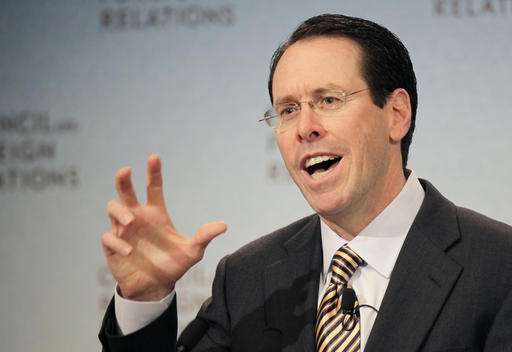Innovation or monopoly? Panel looks at ATT-Time Warner deal

Senators scrutinizing the proposed merger of AT&T and Time Warner homed in on brass tacks with the companies' CEOs. OK, you say this $85.4 billion mega-deal will enhance, not quash, competition and benefit consumers. Will it actually reduce prices that consumers pay?
AT&T CEO Randall Stephenson assured the members of a Senate antitrust panel Wednesday that yes, "We will bring the consumers better price options than what they have today." He said, though, that it wasn't possible at this point to separate how much of the anticipated savings would go to customers of the company's DirectTV, broadband and mobile phone services.
Stephenson and Time Warner CEO Jeffrey Bewkes made the case that the combined company would push technology forward and lead to more choices for customers. "Together, AT&T and Time Warner will disrupt the entrenched pay-TV models, giving customers more options, creating more competition for cable TV providers and accelerating deployment of 5G wireless broadband," Stephenson testified.
In hours of questioning before the Senate Judiciary antitrust subcommittee, the skepticism of some senators seemed to deepen over what would be one of the largest media mergers ever.
"I have yet to be convinced" that the benefits of the merger outweigh the potential negative effects on competition, Sen. Richard Blumenthal, D-Conn., told Stephenson and Time Warner CEO Jeffrey Bewkes.
Panel chairman Sen. Michael Lee, R-Utah said, "The potential anticompetitive favoritism that the combined firm could bestow on its own products is not limited to price or access, but extends to the quality of the offerings as well."
The deal must win approval from federal regulators. It would bind the second-largest U.S. telecommunications company with a media and entertainment conglomerate that owns CNN, HBO, the "Harry Potter" franchise and pro basketball. It's a big-time bet on a partnership between a company that distributes information and entertainment to consumers, and one that produces it.
Critics of the merger range from industry analysts and public-interest groups to President-elect Donald Trump, who promised on the campaign trail that he'd kill the deal "because it's too much concentration of power in the hands of too few."
Gene Kimmelman, a former Justice Department official who leads the consumer-advocate group Public Knowledge, crystallized those concerns.

"There are too few players in these markets already. They are heavily concentrated," he told the panel. The concentration of market power could "harm the democratic process" as well as consumers' pocketbooks, Kimmelman warned.
Mark Cuban, the billionaire sports and media mogul who owns the NBA's Dallas Mavericks, played evangelist for the deal in a fast-moving world of media and entertainment content. Consider Facebook's mergers with WhatsApp, Snapchat and others, he testified: Those deals are driving innovation. Old media like Time Warner can't compete with the likes of Facebook if they can't merge.
What about Trump's avowed opposition?
Stephenson says he's confident the merger will be approved despite the president-elect's objection.
The Justice Department, and possibly the Federal Communications Commission under the incoming Trump administration, will put the proposed deal under close scrutiny. Even assuming the merger is approved, some experts believe regulators might saddle the combined company with so many conditions that the deal would no longer make sense.
Time Warner makes TV shows and movies, while AT&T gets that video to customers' computers, phones and TVs.
The concern is that AT&T might try to make its broadband service stand out by tying it to Time Warner's programs and films. That, critics say, could limit consumer choice.
Because of Time Warner's shows and movies—including "Game of Thrones" and the "Harry Potter" films—and AT&T's ability to gather information about its tens of millions of customers, AT&T thinks it could do a better job tailoring ads and video to user preferences. It could then create more attractive subscription packages suited for phones, where people are increasingly watching video.
But many consumers already consider ads that know everything about them creepy or invasive, and digital-rights groups complain that any preferential deal AT&T could offer with, say, HBO, would hurt competition.
© 2016 The Associated Press. All rights reserved.


















